In a past article in this monorepo series, we’ve discussed setting up CI/CD for JavaScript packages using Yarn Workspaces. This time, we will figure out the same for TypeScript. We’ll learn how to build and test TypeScript projects at scale with Yarn and Semaphore.
At the end of the tutorial, we’re going to have a continuous integration pipeline that builds only the code that changes.
Uniting Yarn and TypeScript
TypeScript extends JavaScript by adding everything it was missing: types, stricter checks, and a deeper IDE integration. TypeScript code is easier to read and debug, helping us write more robust code.
Compared to JavaScript, however, TypeScript saddles us with one more layer of complexity: code must be compiled first before it can be executed or used as a dependency. For instance, say we have two packages, “child” and “parent”. The child is easy to compile since it has no other dependencies:
$ npm install -g typescript
$ cd child
$ tsc
Yet, when we try to do the same with the parent that depends on it, we get an error since the local dependency is not found.
$ cd parent
$ tsc
src/index.ts:1:20 - error TS2307: Cannot find module 'child' or its corresponding type declarations.
1 import { moduleName } from 'child';
Found 1 error.
Without specialized tooling, we have to build and link packages by hand while preserving the correct build order. Yarn Workspaces already solves problems like these in JavaScript. Fortunately, with a bit of tweaking, we can extend it to TypeScript.
Setting up Workspaces in Yarn
Fork and clone the following GitHub repository, which has a couple of packages to experiment with.
 TomFern
/
semaphore-demo-monorepo-typescript
TomFern
/
semaphore-demo-monorepo-typescript
Yarn Workspaces + TypeScript monorepo
Monorepo TypeScript Demo
A hello world type monorepo demo for TypeScript and Yarn Workspaces.
Before Yarn Workspaces
Withouth workspaces, you have to build and link each project separately. For instance:
$ npm install -g typescript
$ cd shared
$ tsc
This builds the shared package. But when we try to do the same with sayhi, we get an error since the local dependency is not found:
$ cd ..
$ cd sayhi
$ tsc
src/sayhi.ts:1:20 - error TS2307: Cannot find module 'shared' or its corresponding type declarations.
1 import { hi } from 'shared';
~~~~~~~~
Found 1 error.
Yarn workspaces help us link projects while keeping each in its own separate folder.
Configure Yarn Workspaces and TypeScript
To configure workspaces, first install the latest Yarn version:
$ yarn set version berry
This creates .yarn and .yarnrc.yml
Initialize workspaces, this creates the packages folder…
We’re going to build a TypeScript monorepo made of two small packages:
- shared: contains a few utility functions.
- sayhi: the main package provides a “hello, world” program.
Let’s get going. To configure workspaces, switch to the latest Yarn version:
$ yarn set version berry
Yarn installs on .yarn/releases and can be safely checked in the repo.
Then, initialize workspaces. This creates the packages folder, a .gitignore, and the package.json and yarn.lock.
$ yarn init -w
You can add root-level dependencies to build all projects at once with:
$ yarn add -D typescript
Optionally, you may want to install the TypeScript plugin, which handles types for you. The foreach plugin is also convenient for running commands in many packages at the same time.
Next, move the code into packages.
$ git mv sayhi shared packages/
To confirm that workspaces have been detected, run:
$ yarn workspaces list --json
{"location":".","name":"semaphore-demo-monorepo-typescript"}
{"location":"packages/sayhi","name":"sayhi"}
{"location":"packages/shared","name":"shared"}
If this were a JavaScript monorepo, we would be finished. The following section introduces TypeScript builds into the mix.
TypeScript Workspaces
Our demo packages already come with a working tsconfig.json, albeit a straightforward one. Yet, we haven’t done anything to link them up — thus far, they have been completely isolated and don’t reference each other.
We can link TypeScript packages using project references. This feature, which was introduced on TypeScript 3.0, allows us to break an application into small pieces and build them piecemeal.
First, we need a root-level tsconfig.json with the following contents:
{
"exclude": [
"packages/**/tests/**",
"packages/**/dist/**"
],
"references": [
{
"path": "./packages/shared"
},
{
"path": "./packages/sayhi"
}
]
}
As you can see, we have one path item per package in the repo. The paths must point to folders containing package-specific tsconfig.json.
The referenced packages also need to have the composite option enabled. Add this line into packages/shared/tsconfig.json and packages/sayhi/tsconfig.json.
{
"compilerOptions": {
"composite": true
. . .
}
}
Packages that depend on other ones within the monorepo will need an extra reference. Add a references instruction in packages/sayhi/tsconfig.json (the parent package). The lines go at the top level of the file, outside compilerOptions.
{
"references": [
{
"path": "../shared"
}
]
. . .
}
Install and build the combined dependencies with yarn install. Since we’re using the latest release of Yarn, it will generate a zero install file that can be checked into the repository.
Now that the configuration is ready, we need to run tsc to build everything for the first time.
$ yarn tsc --build --force
You also can build each project separately with:
$ yarn workspace shared build
$ yarn workspace sayhi build
And you can try running the main program.
$ yarn workspace sayhi node dist/src/sayhi.js
Hi, World
At the end of this section, the monorepo structure should look like this:
├── package.json
├── packages
│ ├── sayhi
│ │ ├── dist/
│ │ ├── src/
│ │ ├── package.json
│ │ └── tsconfig.json
│ └── shared
│ ├── dist/
│ ├── src/
│ ├── package.json
│ └── tsconfig.json
├── tsconfig.json
└── yarn.lock
That’s it, Yarn and TypeScript work together. Commit everything into the repository, so we’re ready to begin the next phase: automating testing with CI/CD.
$ git add -A
$ git commit -m "Set up TS and Yarn"
$ git push origin master
Building and testing with Semaphore
The demo includes a ready-to-work, change-based pipeline in the final branch. But we’ll learn faster by creating it from zero.
If you’ve never used Semaphore before, check out the getting started guide. Once you have added the forked demo repository into Semaphore, come back, and we’ll finish the setup.
We’ll start from scratch and use the starter single job template. Select “Single Job” and click on Customize.
The Workflow Builder opens to let you configure the pipeline.
Build Stage
We’ll set up a TypeScript build stage. The build stage compiles the code into JavaScript and runs tests such as linting and unit testing.
The first block will build the shared package. Add the following commands to the job.
sem-version node 14.17.3
checkout
yarn workspace shared build
The details are covered in-depth in the starter guide. But in a few words, sem-version switches the active version of Node (so we have version consistency), while checkout clones the repository into the CI machine.
Scroll down the right pane until you find Skip/Run conditions. Select “Run this block when conditions are met”. In the When? field type:
change_in('/packages/shared/')
The change_in function is an integral part of monorepo workflows. It scans the Git history to find which files have recently changed. In this case, we’re essentially asking Semaphore to skip the block if no files in the /packages/shared folders have changed.
Create a new block for testing. We’ll use it to run ESLint and unit tests with Jest.
In the prologue, type:
sem-version node 14.17.3
checkout
Create two jobs in the block:
- Lint with the command:
yarn workspace shared lint - Unit testing:
yarn workspace shared test
Again, set the Skip/Run conditions and put the same condition as before.
Managing dependencies
We’ll repeat the steps for the sayhi package. Here, we only need to replace any instance of yarn workspace shared <command> with yarn workspace sayhi <command>.
Now, create a building block and uncheck the Dependencies section. Removing block dependencies in the pipeline makes blocks run in parallel.
Next, set the Skip/Run Condition on the new block to: change_in('/packages/sayhi/').
To finish, add a test block with a lint job and a unit test job. Since this package depends on shared, we can add a block-level dependency at this point. When done, you should have a total of four blocks.
The Skip/Run Condition, in this case, is different because the test block should run if either sayhi or shared change. Thus, we must supply an array instead of a single path in order to let change_in handle all cases correctly:
change_in(['/packages/sayhi', '/packages/shared'])
Running the Workflow
Click on Run the Workflow and then Start.
The first time the pipeline runs, all blocks will be executed.
On successive runs, only relevant blocks will start; the rest will be skipped, speeding up the pipeline considerably, especially if we’re dealing with tens or hundreds of packages in the repo.
Read Next
Adding TypeScript into the mix doesn’t complicate things too much. It’s a small effort that returns gains manifold with higher code readability and fewer errors.
Want to keep learning about monorepos? Check these excellent posts and tutorials:




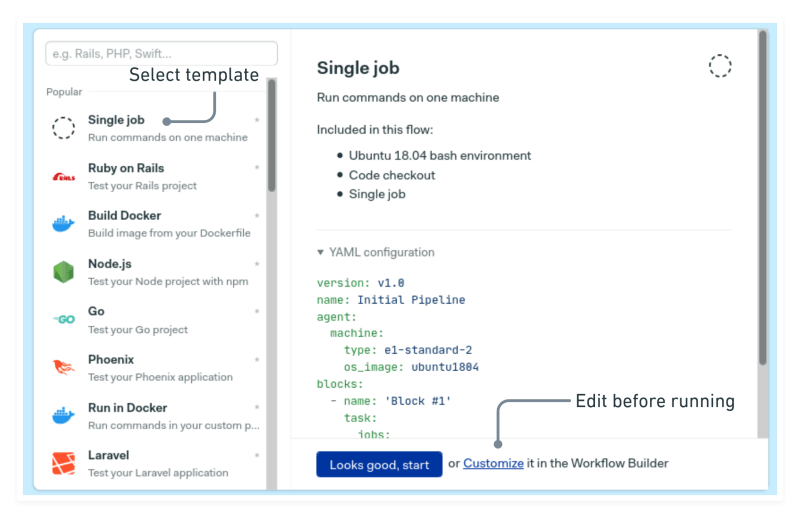
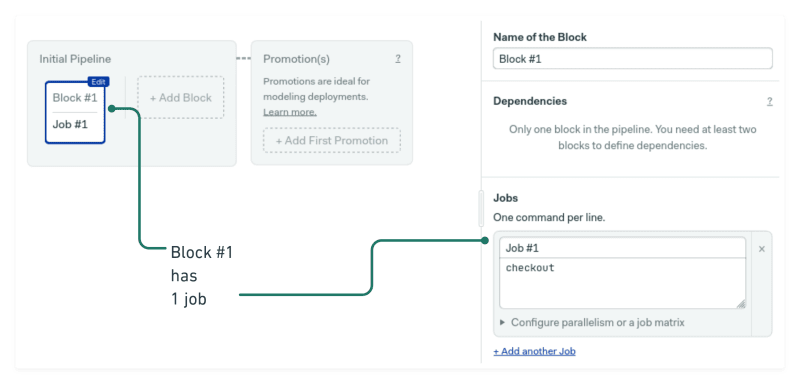

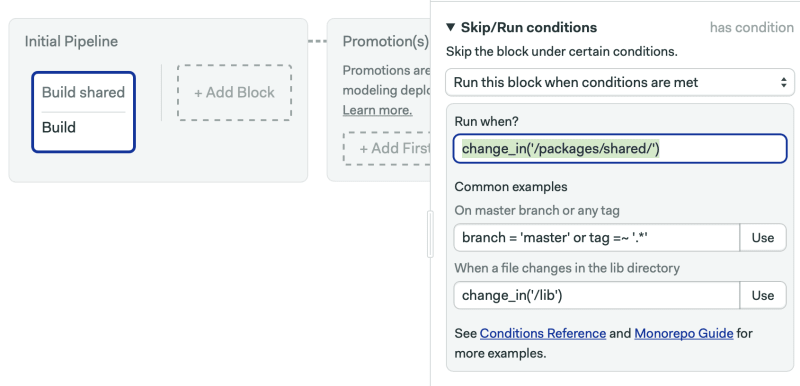



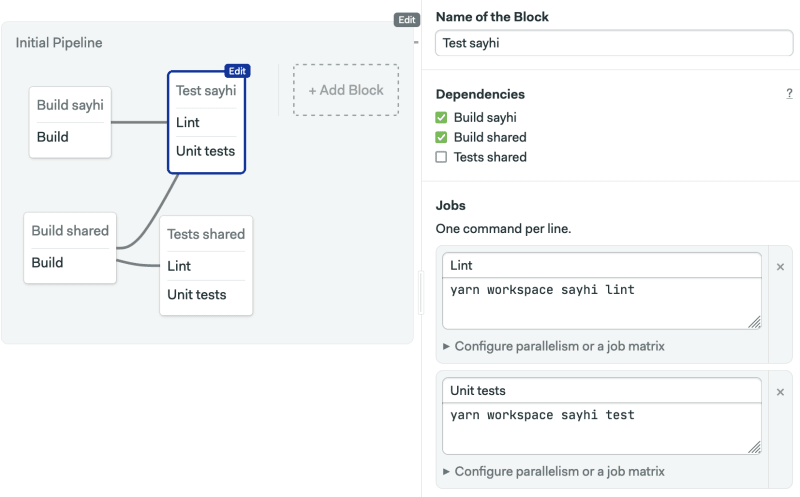
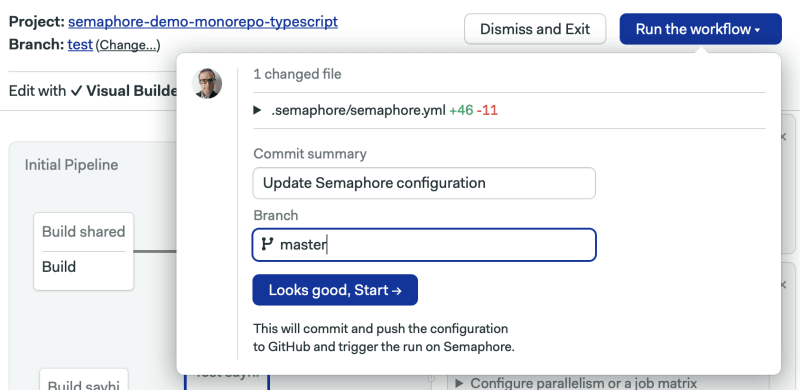
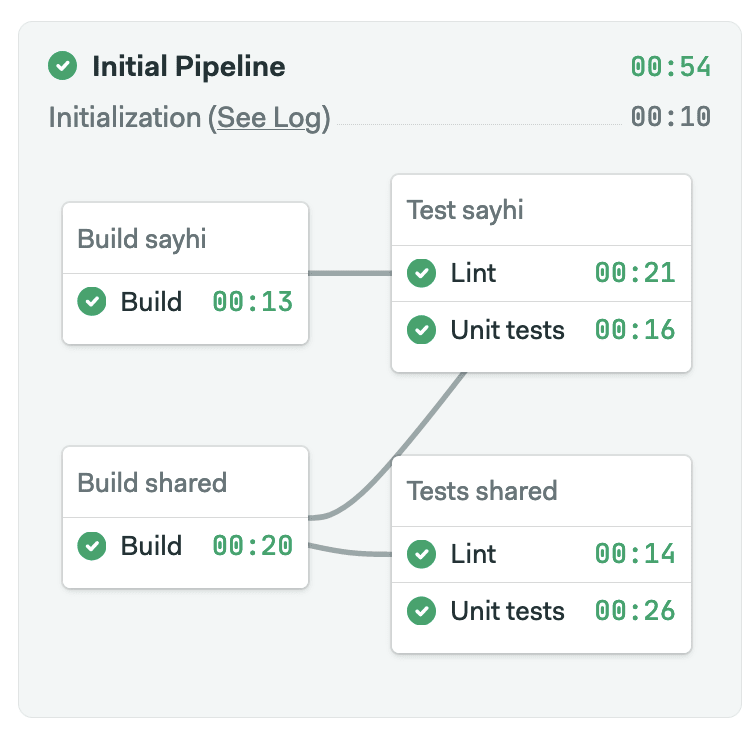
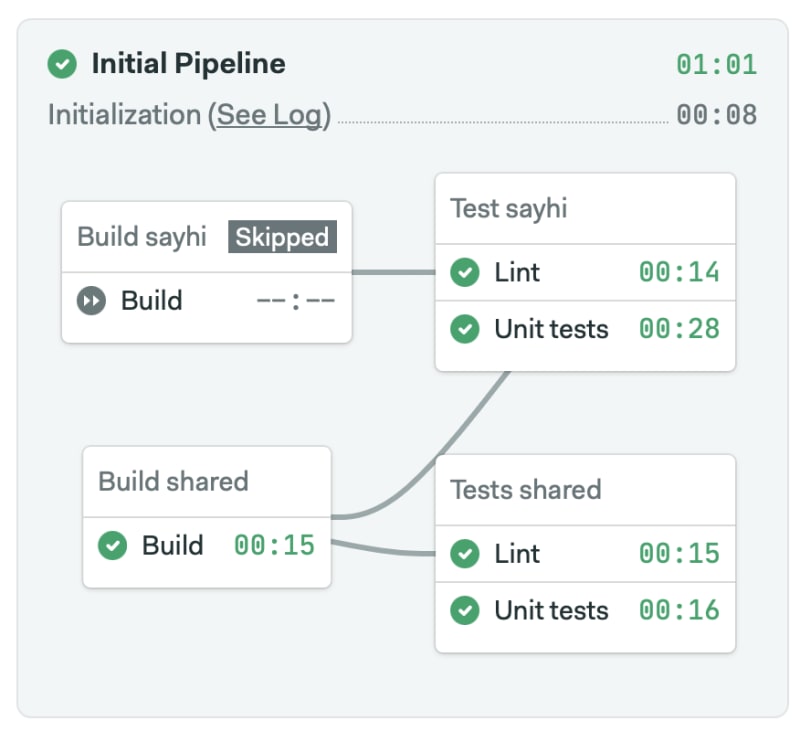

Top comments (0)